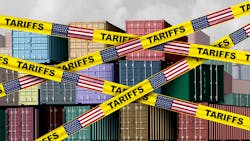Tariffs roll back on coffee, cocoa and fruit, and could ease costs for operators
President Donald Trump has signed an executive order rolling back reciprocal tariffs on many agricultural imports, including most coffee and tea, tropical fruits and fruit juices, cocoa, spices and nuts, among other products, in a move that could lower costs and improve supply stability for convenience services operators.
According to a White House fact sheet, the order, issued Nov. 14, modifies the reciprocal tariff program first announced in April by adding selected agricultural products to Annex II of Executive Order 14257. This modification removes them from the 10% global tariff and related country-specific duties. The changes take effect for qualifying products entered for consumption on or after November 13, 2025.
The items previously subject to the reciprocal tariffs are now excluded based on high U.S. consumer demand and limited domestic production capacity, the White House said. The exemptions also follow new framework trade deals with Argentina, Ecuador, Guatemala and El Salvador that aim to eliminate tariffs on certain foods and other imports from those markets, Reuters reported.
In the months since the tariffs were first announced, the convenience services industry advocacy organization National Automatic Merchandising Association (NAMA) consistently engaged the administration and trade officials to explain the impact of tariffs on convenience services operators and their suppliers. NAMA’s recent industry census estimates that convenience services revenue reached $26.6 billion in 2023, with micro markets driving much of the post-pandemic growth while office coffee service and pantry programs continue to recover.
The National Coffee Association of U.S.A. (NCA) welcomed the move. In a statement issued Nov. 14, NCA President and CEO Bill Murray said the association “applauds President Trump’s action to remove reciprocal tariffs on most coffee imports,” arguing that the change will ease cost-of-living pressures for the roughly two-thirds of American adults who drink coffee daily and help secure supplies for U.S. companies that turn every $1 in coffee imports into $43 in U.S. economic value.
As operators assess pricing, contracts and product mix for 2026, operators and distributors may see a lower cost of goods sold on coffee, tea, cocoa, juices and related products as reciprocal tariffs are removed. They should coordinate closely with suppliers and brokers to understand which SKUs, origins and tariff codes are now duty-free, and which, if any, may remain subject to higher rates, to gauge the effects on margins.
We’re conducting a quick pulse survey of convenience services operators to understand how the recent removal of reciprocal tariffs on key products such as coffee, tea, cocoa, fruits and juices is affecting your business. This survey should take less than 2 minutes to complete.
About the Author
Linda Becker
Editor-in-Chief
Linda Becker is editor-in-chief of Automatic Merchandiser and VendingMarketWatch.com. She has more than 20 years of experience in B2B publishing, writing, editing and producing content for magazines, websites, webinars, podcasts, newsletters and eBooks, primarily for manufacturing and process engineering audiences. Since joining Automatic Merchandiser and VendingMarketWatch.com, Linda has developed a new appreciation for the convenience services industry and the essential role it plays. She is dedicated to serving readers by covering the latest news in the vending, office coffee service and micro market industry. She can be reached at 262-203-9924 or [email protected].

